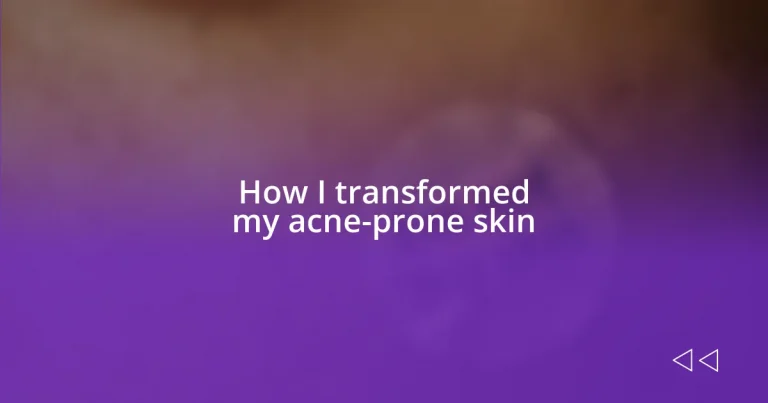Key takeaways:
- Understanding the underlying causes of acne, including hormonal fluctuations, diet, stress, and genetics, empowers individuals to make informed decisions about skincare and lifestyle changes.
- Developing a simplified skincare routine, incorporating gentle products, and tracking progress can significantly improve skin health and boost confidence.
- Managing stress through mindfulness and self-care activities can positively impact skin condition, highlighting the connection between mental and physical well-being.

Understanding acne-prone skin
Acne-prone skin can feel like a never-ending battle. I vividly remember the frustration of waking up to new blemishes, which often impacted my mood and confidence throughout the day. It made me question, “Why is my skin betraying me like this?” Understanding that acne isn’t just a teenage concern but can persist into adulthood brought a sense of relief; it’s common, and many people share this struggle.
At its core, acne is caused by excess oil, clogged pores, bacteria, and inflammation, but I learned that hormone fluctuations can significantly impact skin health, too. Reflecting on my own experiences, I noticed that my breakouts would worsen around my menstrual cycle, reminding me just how interconnected our bodies really are. Have you felt a similar correlation? It’s interesting to realize that changes in our environment, diet, and stress levels can also trigger these frustrating flare-ups.
As I dove deeper into understanding my skin, I came across terms like “sebaceous glands” and “comedones,” which seemed daunting at first. But breaking it down, I found that these glands produce oil to keep our skin hydrated; yet, when they overproduce, it can lead to clogged pores and acne. Once I grasped this concept, it motivated me to explore my skincare routine more carefully. Could simplifying my regimen help? It’s this continual quest for knowledge and adjustment that has helped me take control of my acne journey.

Identifying the causes of acne
Identifying the causes of acne is essential for anyone experiencing this pesky skin concern. I recall a time when I was convinced that my diet didn’t play a role—until I started recording my meals and breakouts. It became clear that certain foods, particularly high in sugar and dairy, triggered a reaction. Knowing this made me feel empowered; I could actually take steps to improve my skin just by being more mindful about what I consumed.
Moreover, let’s not overlook how stress can wreak havoc on our skin! During particularly hectic times at work, I noticed an immediate uptick in breakouts. It’s fascinating how our emotional state can have such a direct impact. I once went on a weekend retreat to relax and focus on self-care. To my surprise, by the end of the trip, my skin had visibly improved. I realized that stress management is just as crucial as skincare.
Taking into account genetic factors is also vital. I remember talking to my mom about my struggles; she mentioned similar battles in her teens. It dawned on me that this might run in the family. Understanding the hereditary aspect helped me look for solutions that had worked for my family members, ultimately contributing to a more tailored approach in dealing with my own acne.
| Cause | Description |
|---|---|
| Hormonal Fluctuations | Changes in hormones, especially during menstrual cycles, can lead to increased oil production. |
| Diet | Food choices, particularly dairy and sugar, can trigger breakouts in some individuals. |
| Stress | High stress levels can exacerbate skin issues, leading to more frequent breakouts. |
| Genetics | Family history can influence susceptibility to acne. |

Developing a skincare routine
Developing a skincare routine felt like embarking on a new journey for me, one that demanded patience and experimentation. I remember standing in front of my mirror, feeling overwhelmed by the sheer number of products available. It hit me that the key was to start simple. I wondered, could a basic routine really transform my skin? It turned out that taking those small, consistent steps made all the difference over time.
- Cleanser: I opted for a gentle cleanser to remove grime without stripping my skin’s natural moisture. This was a game changer!
- Toner: Incorporating a toner with witch hazel helped to balance my skin and minimize pores.
- Moisturizer: I found a lightweight, oil-free moisturizer that kept my skin hydrated but not greasy.
- Sunscreen: Daily sunscreen became non-negotiable; protecting my skin from UV rays is crucial for overall health.
- Treatment: I introduced a targeted treatment with salicylic acid to address breakouts when they appeared.
As I refined my routine, I kept a skincare journal to track what worked and what didn’t. I hadn’t realized how helpful this would be! It felt like I was having a conversation with myself, where I could reflect on my skin’s behavior. There were days when I felt disheartened, especially when new spots emerged despite my efforts. I remember one particular week where my skin seemed to rebel against me. But by sticking to my routine and being patient, I eventually noticed fewer flare-ups. The emotional rollercoaster was real; there were highs when I saw improvement and lows when I felt defeated. Yet, each small step felt like progress toward a clearer future.

Choosing the right products
Finding the right products was one of the most pivotal moments in my skincare journey. I remember sifting through aisle after aisle, feeling lost amidst countless options. It didn’t help that labels often left me with more questions than answers. I found that paying attention to ingredients was a game changer. For instance, choosing non-comedogenic products—meaning they won’t clog pores—was essential. I still feel a sense of relief when I reach for a product that I know is specifically formulated for acne-prone skin.
I struggled with the temptation to believe that all “natural” products would be good for me. After trying a few overly fragrant options, I quickly learned that not all natural ingredients are gentle. I had a particularly bad reaction to something touted as a miracle oil, which left my skin feeling irritated and tense. Since then, I’ve turned to simple formulations with clear ingredient lists. It begs the question: how can you trust a product if you can’t pronounce half the ingredients on the label? I now choose brands that prioritize transparency, which empowers me to make informed decisions.
Lastly, I’ve realized that products are not a one-size-fits-all. My best friend and I have completely different skin types, yet we often found ourselves raving about the same brands. I recall sharing my favorite treatment with her, only to hear her say it just didn’t work for her. It made me appreciate the importance of testing things out for myself—everyone’s skin is unique, and what works wonders for one person might not do a thing for another. So, I always encourage others to consider their own skin’s responses and to keep experimenting until they discover what truly resonates with them.

Managing stress and acne
When I started to notice that stress seemed to make my acne worse, I couldn’t help but wonder if there was a deeper connection. I began to realize that my anxiety would elevate hormone levels, particularly cortisol, which has been linked to breakouts. In moments of intense pressure, I found myself contemplating: could taking control of my stress responses actually lead to clearer skin? My answer turned out to be yes.
Practicing mindfulness and incorporating yoga into my daily routine became invaluable. I remember the first time I unrolled my yoga mat—I felt both apprehensive and hopeful. As I moved through poses, focusing on my breath, I noticed the tension in my body slowly release. It felt liberating, like I was shedding not just stress, but also that nagging urge to scratch at my skin during flare-ups. I began to understand that calming my mind could directly support the quest for healthier skin.
Additionally, I made a point to carve out time for things that brought me joy. Whether it was diving into a good book or simply taking a leisurely walk, these small acts of self-care made a noticeable difference. I began to ask myself: what activities genuinely uplift my spirit? When I prioritized these moments, it wasn’t just my mood that improved; my skin started to reflect that inner peace, too. My journey had taught me that managing stress wasn’t merely a band-aid for my acne problem; it was an integral part of my transformation.

Tracking progress and adjustments
Tracking my progress became an essential part of my skincare routine. I started keeping a journal where I logged my daily product use and any changes in my skin’s condition. It was eye-opening to see patterns emerge—certain products would work wonders one week and then lead to breakouts the next. Reflecting on this, I couldn’t help but wonder: how often do we overlook the importance of tracking our unique skin responses?
At times, I would take photos every couple of weeks to visually map my journey. It wasn’t just about finding clarity in my skin; it was also a boost for my motivation. When I’d glance back at those “before” pictures, I would remind myself how far I’d come. What initially felt like a never-ending battle slowly transformed into a source of pride. I began to understand that every slight improvement was worth celebrating, even if it seemed small.
Adjustments became a natural part of my process. If I noticed a product was causing irritation, I learned to trust my instincts and swap it out quickly. One day, after a particularly rough week with my skin, I decided to simplify my routine entirely. I stripped it back to just a gentle cleanser and moisturizer. That instinctive change led to clearer skin almost overnight. It made me realize that sometimes, less truly is more, and that listening to my skin’s needs was a crucial element of my transformation.













